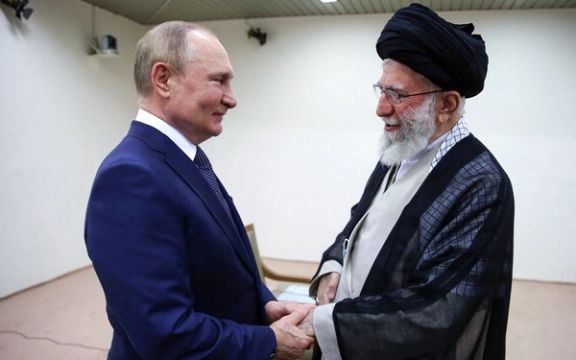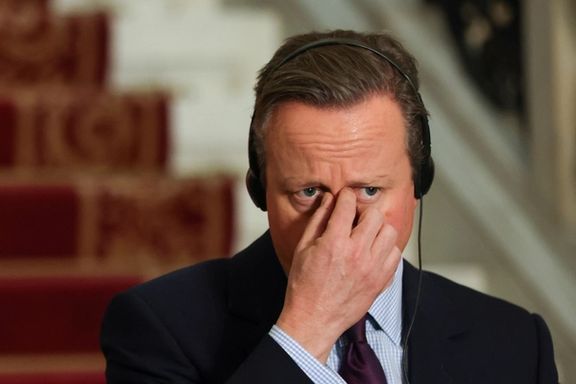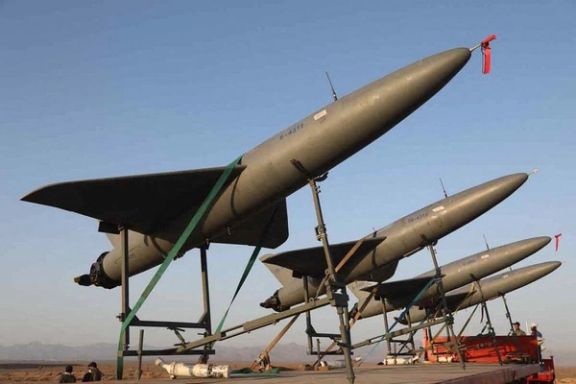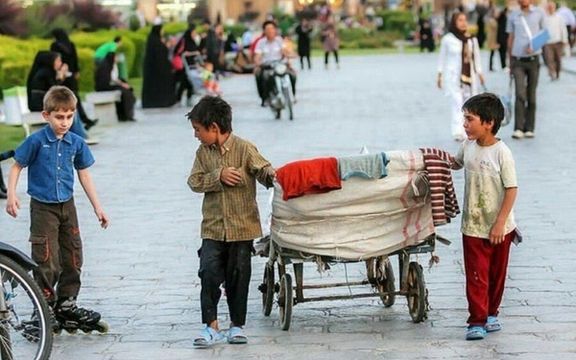New Research Shows Rise In Child Marriages In Iran

Approximately 184,000 marriages involving girls under the age of 15 were registered in Iran between 2017 and 2022 as girls dropped out of school at increasing rates.

Approximately 184,000 marriages involving girls under the age of 15 were registered in Iran between 2017 and 2022 as girls dropped out of school at increasing rates.
A report from the Research Center of the Iranian Parliament said girls were dropping out of school to get married in rising numbers. "The total number of school dropouts in the academic year 2015-2016 was 862,777, and in the academic year 2021-2022, it surged by 26%, reaching 911,272."
Mansour Fat’hi, an associate professor of social welfare at Allameh Tabataba'i University, pointed to poverty as the primary issue in slum areas, underscoring that around 70% of underprivileged children find themselves in the lowest economic conditions amidst Iran's dire economic crisis.
The Ministry of Education reported that approximately 30% of high school students and 20% of girls aged 15 to 18 left school in 2022 due to early marriages.
Despite global standards considering individuals under 18 as "children", child marriages are allowed from the age of 13 for girls and 15 for boys in Iran. Supreme Leader Ali Khamenei has consistently emphasized policies promoting population growth, fertility, and early marriages.
Iran's Statistical Center recorded around 25,900 cases of girls under 15 getting married in 2022, less than the 32,000 such cases registered in 2021, suggesting discrepancies in the data released by the government.
UNICEF shortlisted Iran in the Middle East and North Africa's top five countries for child marriage in 2020 and according to Iran Open Data, one out of five marriages is among minors.

Russia's support for the United Arab Emirates in its dispute with Iran over the ownership of three Persian Gulf islands has turned into a controversy in Tehran.
The Iranian leadership, typically reticent about Russia's double standards, has, for the second time this year, heightened its response to Moscow's stance. Supreme Leader Ali Khamenei's most senior foreign policy adviser, former Foreign Minister Ali Akbar Velayati, implicitly criticized Russia's behavior by stating, "Iran will not allow any foreign entity to intervene in its internal affairs."
In a similar situation earlier this year, Velayati, following Russia's joint statement with the Gulf Cooperation Council (GCC) in September, emphasized the importance of Iran's friendly and strategic ties with Russia. He pointed out that both sides' bilateral and regional interests should be considered. Notably, Supreme Leader Ali Khamenei remained silent, as is often the case, regarding Russia's actions that undermine Iran's territorial integrity.
Recently, the Iranian Foreign Ministry criticized "part of the statement of the 6th Arab-Russian Cooperation Forum held in Morocco, dismissing the claims on three Iranian islands as baseless and unacceptable." Foreign Ministry Spokesman Nasser Kanaani asserted that "The Islands of Abu Musa, Greater Tunb, and Lesser Tunb are eternal parts of Iran and inseparable from the Islamic Republic." He underscored that Iran's sovereignty over these islands is non-negotiable, emphasizing the country's commitment to protecting its territorial integrity.

In response to the Foreign Ministry's statement, Iranian international lawyer Reza Nasri highlighted that Russia's support for the UAE's sovereignty claims over the Persian Gulf islands contrasts with Iran's support for Russia in the Ukraine conflict. Nasri emphasized the need for Russia to be a strategic ally to Iran and called for respect for Iran's territorial integrity.
Britain, which maintained control of Abu Musa, and the Greater and Lesser Tunb it had occupied in the 19th century, withdrew its forces from the Persian Gulf in 1971 and the United Arab Emirates was formed. However, Iran’s Imperial government at the time decided to reclaim what it believed were historical Iranian islands.
Mohammad Reza Shah sent the Iranian navy to secure all three in November of the same year, two days before UAE was established. Iranian forces remain on the islands, with only Abu Musa having much of a civilian population of several thousand.
X (Twitter) users criticized the untimeliness of Russia's behavior, especially as Iran is working to finalize a strategic security pact with Russia. Some social media users labeled Iranian officials as "traitors" over Tehran's response.
Meanwhile, Foreign Minister Amirabdollahian called on Moscow to respect Iran's territorial integrity and sovereignty, after Russia supported the UAE’s sovereignty claims over three Persian Gulf islands. He said during a telephone conversation with his Russian counterpart Sergey Lavrov: "The Islamic Republic of Iran completely rejects any claim in this regard by any party. Respect for the sovereignty and territorial integrity of countries is one of the fundamental principles in relations between countries, and Tehran makes no compromises with any party when it comes to respect for its territorial integrity and sovereignty issues." Lavrov responded that "The sovereignty and territorial integrity of the Islamic Republic of Iran has always been respected by Russia and Moscow's official policy in this regard should never be doubted."
Earlier in this year, the media pointed out that some Iranian hardliners supported Russia's humiliating stances on the three Iranian islands in the Persian Gulf. At the time Raisi-administration-owned daily Iran charged that Iranian media outlets that criticized Russia's positions get their orders from the United States.

Iran's Naval Forces introduced new cruise missiles on Sunday shortly after the US military blamed Iran for a drone attack on a vessel in the Indian Ocean.
US CENTCOM announced on Saturday that a drone launched from Iran targeted and hit a chemical tanker in the Indian Ocean, known as the Chem Pluto, the first time the US has directly blamed Iran for an attack as maritime routes have become a key strategy from Iran's proxies amidst the war in Gaza.
A fire onboard was successfully extinguished, and there were no casualties. Iran has not commented. It comes while its Yemeni proxy the Houthis have announced a blockade of the Red Sea, in allegiance with Iran-backed Hamas in its war against Israel.
According to the state news agency IRNA, the additions to the army's naval forces include strategic cruise missile systems named Talaiyeh and Nasir, along with some other drone systems and a submarine locator system.
During the unveiling ceremony, Shahram Irani, the commander of the naval forces, highlighted that the Talaiyeh sea cruise missile boasts a range exceeding 1,000 kilometers and operates intelligently throughout its flight. Additionally, Irani introduced the Nasir sea cruise missile, which boasts a range of over 100 kilometers and exhibits highly advanced capabilities in demolition operations.
Iran, possessing one of the largest missile programs in the Middle East, asserts that its missiles can reach Israel and US bases in the region. Despite opposition from the United States and European countries, Tehran has declared its intention to persist with the development of its “defensive” missile program.
Iran maintains that its ballistic missiles serve as a deterrent and retaliatory force against the United States, Israel, and other potential regional adversaries.

The UK foreign secretary summoned Iran's chargé d’affaires Friday, warning that Iran's "malign" activities will not be tolerated on UK soil or in the Middle East.
David Cameron's action followed revelations that the Iranian regime planned to assassinate two Iran International news presenters, Sima Sabet and Fardad Farahzad, in London last year.
The recently appointed foreign secretary said he wanted "to make it clear that these threats will not be tolerated", according to the Telegraph.
Over 15 Iranian threats and plots to kill British or UK-based individuals have been reported since the beginning of last year, according to government officials.
On Friday, England's Central Criminal Court sentenced a man arrested for gathering information about Iran International's London headquarters to three and a half years in prison.
Iran must be sent “an incredibly clear message that this escalation will not be tolerated,” Cameron said, citing “the threat of Iran” as one of five significant “crises” causing “extraordinarily difficult times for the world”, in addition to the Russia-Ukraine conflict, terrorism, and climate change.
The UK's tough stance follows a similar move by the US on Friday. In a clear statement, the White House stated that Iran is deeply involved in planning drone and missile attacks against commercial vessels in the Red Sea by providing intelligence to the Houthis which have blockaded the major trade route in allegiance with fellow Iran-backed militia, Hamas, in its war against Israel.

In a major development, the Pentagon said that the kamikaze drone which struck an oil tanker in the Indian Ocean early Saturday was launched directly from Iran.
The incident comes against a backdrop of Houthi attacks on commercial vessels in the Red Sea, and may suggest an escalation of regional tensions that began with the Hamas rampage of Israel on October 7 and the ensuing Israeli onslaught on Gaza.
So far, the maritime theater of conflict was confined to the Red Sea, with Iran-backed Houthis in Yemen the sole instigator.
One day before the Saturday attack, the US government accused Iran of being “deeply involved” in Houthi operations in the Red Sea. This is the first time in the recent conflict, however, that the Biden administration blames Iran for directly striking a vessel –and the first time such a strike takes place so far away from the Red Sea.
The tanker Chem Pluto was hit 200 nautical miles from the Indian coast, carrying oil from Saudi Arabia to India.
MV Cham Pluto is a Liberian-flagged, Japanese-owned vessel managed by the Netherlands’ Ace-Quantum Chemical Tankers, which is reportedly connected to the Israeli shipping tycoon Idan Ofer. And that may explain why it was selected as a target.
Some Iranian one-way “kamikaze” drones boast a range of “over 1,000 kilometers”. The one most publicized, perhaps, is Shahed 136 that has been used by Russia against Ukraine.
Iran has not yet reacted to the claim that it was behind the attack on Chem Pluto. But the regime officials have repeatedly denied involvement in the Houthi attacks.
“The resistance has its own tools of power and acts according to its decisions and capabilities,” Iran’s deputy foreign minister said Saturday in reaction to the White House claim that the regime in Tehran was "deeply involved" in planning the Houthi operations. Iran’s foreign minister repeated the counterclaim.
“We told the Americans that if we had a role, we would have declared it,” he said Saturday. “We do not have any proxy groups. These groups are real and act in line with their country's national security.”
The “kamikaze” attack on an oil tanker headed for India 200 miles off the Indian coast is a serious development, whoever the perpetrator. It could cause shipping insurance rates to go higher and ‘unsafe’ waters expand to the Indian Ocean and elsewhere, exacerbating the disruption caused by Houthi attacks in the Red Sea.
In an interview with the Telegraph on Saturday, the UK foreign secretary warned about dangers to “maritime freedom” caused by recent attacks. He said Iran must be sent “an incredibly clear message that this escalation will not be tolerated.”
Only hours earlier, the IRGC’s deputy commander had threatened that the Mediterranean Sea could be closed if the US and its allies continued to commit "crimes" in Gaza –without any suggestions as to how such a threat could be realized.
In the US, many critics of President Joe Biden say it is his reluctance to confront Iran that has emboldened the regime and its proxies in the region.
“Iran proxies, the Houthi rebels, are small in number but have all but stalled commerce in the Red Sea while we do nothing to stop them,” said former US national security advisor John Bolton on Saturday. “The mullahs in Tehran will not cooperate with our government no matter how hard Biden and Obama-era officials blindly push a return to the flawed 2015 nuclear deal to appease them.”
Congressman Mike Collins seconded the critique.
“Iran can strike civilian ships and the Biden administration will do nothing in return. Deterrence is dead,” he posted on X Saturday evening.

The CEO of the Association for the Support of Children has raised alarm over the deteriorating conditions for working children in Iran.
Noting that observations on the streets indicate a worsening situation, Tahereh Pazhouhesh emphasized that the age of child labor in Iran has now reached as low as seven years.
In a recent interview with Faraz Daily, she expressed concern that all activities related to child labor are being carried out in a negligent manner without proper supervision.
Criticizing the lack of expertise and awareness among city officials regarding children, she highlighted that, "Until specific budgetary resources are allocated for children, no changes will occur in the conditions of child labor."
In centers previously under the supervision of the Welfare Organization, Pazhouhesh disclosed that they used to care for child laborers. However, due to insufficient capacity, the government was ultimately compelled to release the children after just one week.
Meanwhile, Alireza Zakani, the Mayor of Tehran, asserted on Saturday that issues related to drug addiction and child labor would be resolved by the end of the Iranian year (March 20).
Zakani claimed that a special plan would be implemented to ensure that the face of Tehran is "completely clean" of the challenges posed by drug addiction and child labor before the Persian New Year, Nowruz.
However, Zakani's statements have triggered a wave of negative reactions from activists and social media users. Activists pointed out that child laborers are exposed to harassment and sexual abuse. Some social media users also attributed the growth of child labor, drug addiction, and homelessness to the policies of the Islamic Republic over the past four decades.